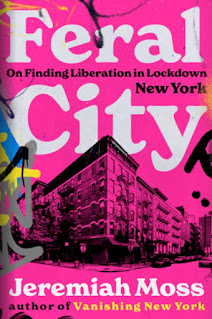Astor Place has
long been a site of public protest and free expression. Today, after an upscale redesign, it is being controlled. This is what happens in a neoliberalized city. Public space becomes quasi-privatized.
And as urban scholar Sharon Zukin notes in
Naked City, "Privatized public space...tends to reinforce social inequality."

New signs asserting the rules have gone up over Astor Place. Prohibited activities include the "unreasonable obstruction" of sitting areas and pedestrians, along with camping, storing personal belongings, and lying down.
This language clearly refers to the presence of homeless people and presumably will be used to harass them out of the new plaza. They can also be used to stop political protests and spontaneous, unregulated art performances.
Skateboarding is also not allowed, though it's been an unofficial
Astor Place tradition for decades. In addition to this sign, there are several other day-glo signs placed on the ground around the plaza. They look like they're yelling. If you did try to skateboard (or bike) here, you'd have to maneuver around the signs, like in an obstacle course, there are so many of them.

You also can't smoke at the New Astor Place. It used to be an open public square, a city street, but now it's officially a Pedestrian Plaza, and Bloomberg outlawed smoking in Pedestrian Plazas.
A
Pedestrian Plaza is much more controllable than an ordinary public square. The city's Department of Transportation
began the Public Plaza Program in 2008 under Commissioner Janette Sadik-Khan of the Bloomberg Administration. They hyped Pedestrian Plazas as a way to improve the "quality of life" for New Yorkers by removing cars from the streets and providing open space for sitting.
But one thing Pedestrian Plazas do really well, aside from controlling the populace, is to raise property values in the surrounding area. The Times Square Pedestrian Plaza, for example, helped to hike retail rents by 71 percent in just six months. Sadik-Khan called it “the largest increase in the city’s history.”
 photo: Taji Ameen and Justin Fly, via Vice
photo: Taji Ameen and Justin Fly, via Vice
The new Astor Place Pedestrian Plaza is run by the Business Improvement District known as Village Alliance, a private group managed mostly by real-estate developers. BIDs are invested in raising property values. As Max Rivlin-Nadler wrote in
The New Republic this year, "
Business Improvement Districts are a favored neoliberal practice that transforms mixed-income neighborhoods into the same chain stores one can find at any outlet mall across the country."
A BID can also "hire its own security to patrol an area, effectively control who is offered retail space, kick out street vendors, and influence legislation and expansion efforts."

People who live in nearby condos also want to raise property values. Recall
the rumor we heard this summer that "some type of committee at the Sculpture for Living building," the green glass condo tower on the square, is helping to dictate what happens at Astor Place.
(While I've not been able to confirm that rumor, I don't doubt it. We saw something similar happen with Washington Square Park, when a private group of "wealthy women" incorporated themselves into a conservancy to
push “unsightly” hot dog vendors from the park.)
 Where's the Cube?
"BIDs," Sharon Zukin wrote, "are an oligarchy; they embody the norm that the rich should rule."
Where's the Cube?
"BIDs," Sharon Zukin wrote, "are an oligarchy; they embody the norm that the rich should rule."
They "direct a new kind of governance of public spaces by creating 'discretely manicured spaces' as
playgrounds for adult consumers who have internalized norms of proper behavior and keep watch over others to make sure they conform to the rules. In an implicit bargain for the power to exercise control, BIDs provide quality services that show users they are being catered to: cleanliness, safety, well-tended flower beds, poetry readings."
When our public spaces are quasi-privatized, given over to
zombie urbanism, they no longer belong to us. They may look pleasant on the surface, with benches, umbrellas, and public art installations, but they conceal a darker intention.
They are meant to control the people and the spaces of the city. They increase inequality and raise the rents. They squash public dissent. They package corporate advertising as interactive installation. As they hyper-gentrify our neighborhoods, they displace those of us who might protest.
Be aware. You are being civilized.
Previously:
Battle for Astor Place
Astor Place Farce




































